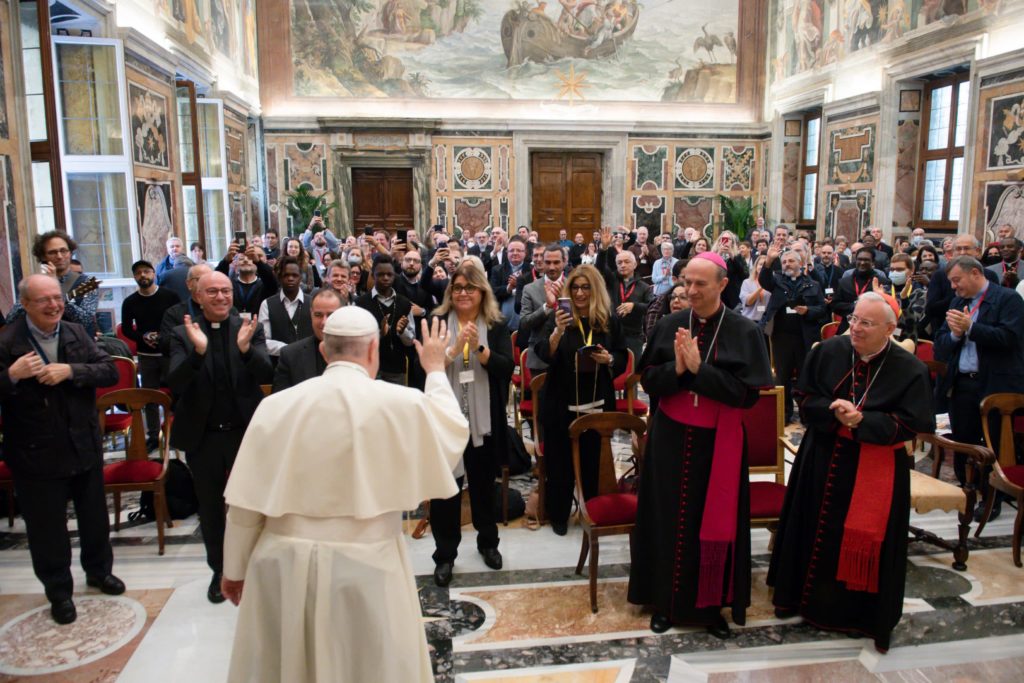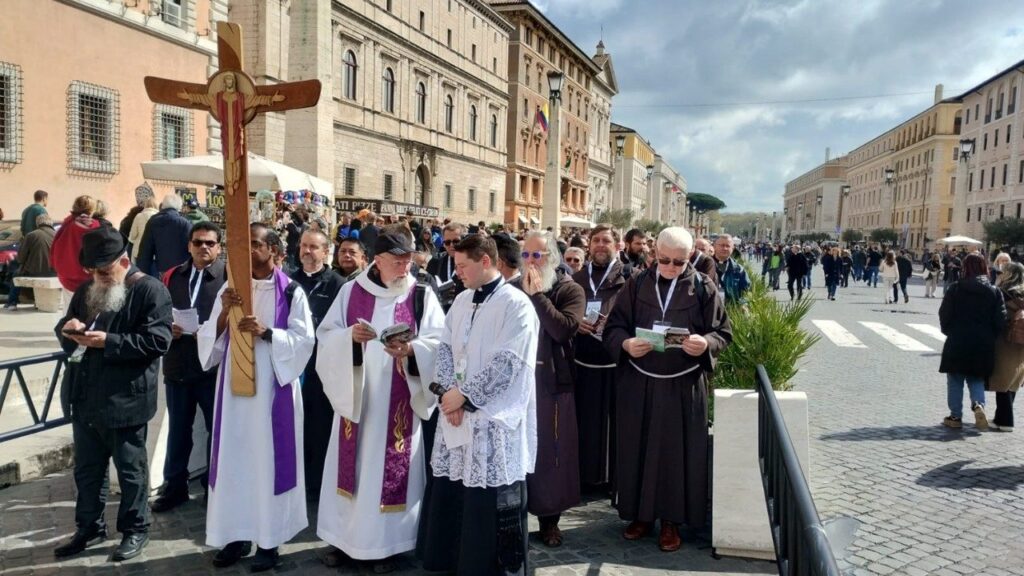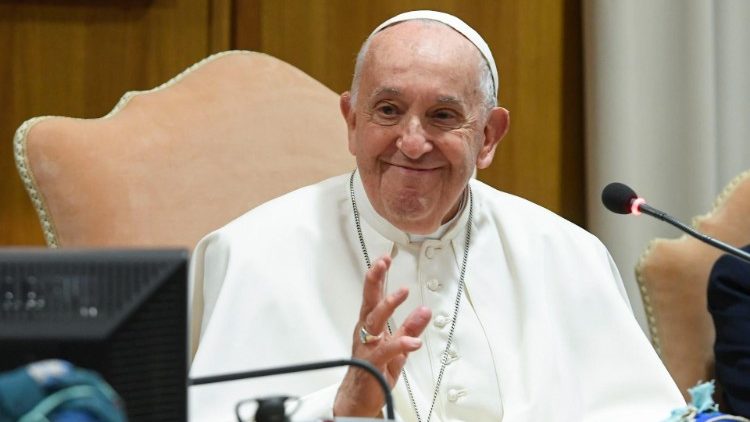Migrants Are a Gift That Invites a Society ‘To Grow’
Pope Francis’ Address to the Participants in the Congress Organized by the Migrants Foundation of the Italian Episcopate

In the light of the Latin American experience, Pope Francis says that he “can affirm that, ‘if they are helped to integrate, migrants are a blessing, a richness and a new gift, which invites a society to grow.’” (Encyclical Fratelli Tutti, 135).
On November 11, 2021, the Holy Father received the participants in a Congress, organized by the Migrants Foundation of the Italian Episcopal Conference (CEI).
In his address, the Pontiff highlighted the theme guiding the works of this meeting: “Italians in Europe and the Christian Mission.” “On one hand, I see in it the pastoral concern that has always stimulated us to know the reality, in this case, Italian mobility and, on the other, the missionary desire that the latter be ferment, leaven of New Evangelization in Europe.”
Three Reflections
In his framework, the Pope shared three reflections, “which I hope will help you in the present and in the future.” The first, he said, “refers to mobility, to migration. We often see migrants as “others” than ourselves, as strangers,” but, “in reality, also reading the data on this phenomenon, we discover that emigrants are an important part of ‘us’ (. . .). In the case of Italian emigrants “people close to us: our families, our young students, licentiates, the unemployed, our businessmen.”
The second reflection refers to Europe. ”The reading of Italian emigration to the European Continent must make us increasingly aware that Europe is a common home. The Church in Europe also cannot fail to consider the millions of emigrants of Italy and other countries, who are renewing the face of cities and countries. And, at the same time, nourish ‘the dream of a united Europe, able to recognize the common roots and to rejoice over the diversity that inhabits it’ (Encyclical Fratelli Tutti, 10).” Europe is called to revitalize in today’s world its vocation to solidarity in subsidiarity,” he added.
The third reflection refers “to the witness of faith of the communities of Italian emigrants in European countries,” as, “thanks to their rooted popular religiosity they have communicated the joy of the Gospel, they have made visible the beauty being open and welcoming communities, they have shared the paths of the local Christian communities.” It is “a style of communion and mission, which has characterized their history and, I hope, that it will also mark their future.”
It “is an inheritance that must be preserved and taken care of, finding the way to revitalize the proclamation and witness of the faith. And this depends to a great extent on the dialogue between generations, especially between grandparents and grandchildren. This is very important, I insist: between grandparents and grandchildren, then, ‘the expressions of popular piety have much to teach us [. . . ], especially when we think of the New Evangelization’ (Apostolic Exhortation Evangelii Gaudium, 126).”
Welcome, Accompany, Promote, Integrate
His Holiness then stressed the need to implement “the four steps” with migrants: to “welcome, accompany, promote and integrate” (. . . ) If these people integrate, “they can help to breathe the air of a diversity that regenerates unity; they can enhance the faith of catholicity; they can give witness of the apostleship of the Church; they can generate stories of holiness.”
The Successor of Peter was also pleased to see that “the synodal journey of the Churches in Italy, thanks also to the pastoral work of the Migrants Foundation, suggests that migrant people be regarded as an important resource for the renewal and mission of the Churches in Europe.” Then, “the world of migrant young people especially, often disoriented and alone, will see a Church with attentive Pastors, walking with them and among them, “ he said.
Here is Exaudi’s translation of Pope Francis’s full address.
* * *
The Holy Father’s Address
Dear Brothers and Sisters,
I welcome you and I thank Cardinal Bassetti for his words of greeting and presentation. I greet the Secretary-General of the Italian Episcopal Conference. The President of the Migrants Foundation with its Director and collaborators, and I express a grateful greeting to all of you, priests and pastoral collaborators, who are at the service of the Italian-speaking communities and missions in Europe.
The theme guiding the works of your meeting is “Italians in Europe and the Christian Mission.” On one hand, I see in it the pastoral concern that always stimulates us to know the reality, in this case, Italian mobility and, on the other, the missionary desire that the latter be ferment, leaven of the New Evangelization in Europe. In this framework, I would like to share three reflections, which I hope will help you in the present and in the future.
The first refers to mobility, to migration. We often see immigrants only as “others” from us, as strangers. In reality, also reading the data on the phenomenon, we discover that emigrants are an important part of “us, as well as, in the case of Italian emigrants, people close to us: our families, our young students, licentiates, the unemployed, our businessmen. Italian migration reveals — as the great Bishop Jeremiah Bonomelli, Founder of the Work of Assistance to Emigrants in Europe and the Middle East — wrote: a “girl, Italy,” in movement in Europe, especially, and in the world. It’s a reality that I feel especially close to, given that my family also emigrated to Argentina. The “us” therefore, in reading about mobility.
The second reflection refers to Europe. The reading of Italian emigration to the European Continent must make us increasingly conscious that Europe is a common home. The Church in Europe also cannot fail to consider the millions of emigrants of Italy and other countries that are renewing the face of the cities and countries. And, at the same time, nourish “the dream of a united Europe, able to recognize the common roots and to rejoice in the diversity that inhabits it” (Encyclical Fratelli Tutti, 10). It’s a lovely mosaic, which must not be marked or corrupted by prejudices, hatred veiled in respectability. Europe is called to revitalize in today’s world its vocation to solidarity in subsidiarity.
The third reflection refers to the witness of faith of the communities of Italian emigrants in the European countries. Thanks to their rooted popular religiosity, they have communicated the joy of the Gospel; they have made visible the beauty of being open and welcoming communities; they have shared the paths of the local Christian communities. A style of communion and mission has characterized their history, and I hope that it will also mark their future. This is a lovely thread, which unites us to the memory of our families. How can we not think of our emigrant grandparents and their capacity to be generators also in terms of Christian life?
It’s an inheritance that must be preserved and cared for, finding ways to revitalize the proclamation and witness of the faith. And this depends to a great extent on the dialogue between generations, especially between grandparents and grandchildren. This is very important, I insist: grandparents and grandchildren. In fact, Italian young people moving in Europe today are very different, in regard to the faith of their grandparents and yet, in general, they are very attached to them. And it’s crucial that they continue to be attached to their roots, precisely when they find themselves living in other European contexts; the sap they extract from their roots, from their grandparents, is precious, a sap of human and spiritual values. Hence, if this dialogue between generations exists, between grandparents and grandchildren, then, in fact, “the expressions of popular piety have much to teach us [. . . ] especially when we think of the New Evangelization” (Apostolic Exhortation Evangelii Gaudium, 126).
In the light of the Latin American experience, I was able to affirm that “migrants, if helped to integrate, are a blessing, a richness and a new gift that invites a society to grow” (Encyclical Fratelli Tutti, 135). To welcome, accompany, promote and integrate these are the four steps. If we don’t succeed in integration, there can be grave problems. I always remember the tragedy of Zaventem, those who did it were Belgians, but children of non-integrated emigrants and condemned to a ghetto. To welcome, accompany, promote and integrate, the same can be said of Europe. Migrants are also a blessing for us and our Churches in Europe. If they integrate, they can help to breathe the air of a diversity that regenerates unity; they can enhance the face of catholicity; they can give witness of the apostleship of the Church; they can generate stories of holiness. Let’s not forget, for example, that Saint Frances Xavier Cabrini, Lombard religious emigrate among emigrates, was the first holy citizen of the United States of America. At the same time, migrations have accompanied and can support, through encounter, relationship, and friendship, the ecumenical journey in the different European countries, where the faithful belong in the main to Reformed or Orthodox communities.
In this connection, I’m happy to see that the synodal journey of the Churches in Italy, thanks also to the pastoral work of the Migrants Foundation, suggest to consider migrant people as an important resource for the renewal and mission of the Churches in Europe, especially the world of young people in migration, often disoriented and alone, will have to see a Church with attentive Pastors, walking with them and among them.
May Blessed Monsignor Giovanni Battista Scalabrini, whose action among emigrants enhanced the mission of the Church in Italy, and Saint Frances Cabrini, Patroness of emigrants, guide and protect your path in the Churches of Europe for a new, joyful and prophetic proclamation of the Gospel.
Dear brothers and sisters, I thank you for what you are doing. I encourage you to continue with your commitment and to think creatively of a mission that looks to the future of our communities so that they are increasingly rooted in the Gospel, are fraternal and welcoming. I bless you and accompany you. And you, please, don’t forget to pray for me. Thank you.
© Libreria Editrice Vatican
Translation by Virginia M. Forrester
Related

Technology with a Human Face: Pope Francis’ Call for Ethical and Caring Use
Exaudi Staff
01 April, 2025
1 min

Pope Francis Continues Optimistic Recovery and Maintains Work Pace
Exaudi Staff
01 April, 2025
2 min

The Pope to the Missionaries of Mercy: God became man to reveal to the world that he never abandons us!
Exaudi Staff
30 March, 2025
2 min

God’s Mercy and the Call to Peace in Pope Francis’ Angelus
Exaudi Staff
30 March, 2025
3 min
 (EN)
(EN)
 (ES)
(ES)
 (IT)
(IT)

